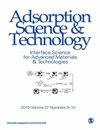Citric Acid Promotes the Mobilization of Phosphorus under the Lower Concentration of Low Molecular Weight Organic Acids in Acidic Forest Soil
IF 3.2
4区 工程技术
Q2 CHEMISTRY, APPLIED
引用次数: 3
Abstract
Low molecular weight organic acids (LMWOAs) secreted by plant roots enhanced the release of inorganic P (Pi) and organic P (Po) into the soil solution and thereby increased plant-available Pi in soils. Not the effect of LMWOAs on inducing organic P (Po) released into soil solution through soil microorganisms at different temperatures was poorly understood, but the transform mechanism for P fraction was also not well explained. This study used three experiments to determine the release of P and the transformation mechanism of P fractions induced by oxalic acid, citric acid, and malic acid in acidic forest soils. The results showed that LMWOAs, as carbon sources for microorganisms, mobilize Po more effectively than glucose. Inorganic P and organic P were released by LMWOAs followed by oxalic acid > citric acid > malic acid if the substrates of P and LMWOAs were enough. There may be a critical threshold for the concentration of citric acid and oxalic acid between 10 mM and 25 mM to require for the solution of adsorbed and precipitated P, respectively. In all, LMWOAs increased the concentration of labile P by decreasing the concentration of stable P. The results indicated that LMWOAs can significantly promote P availability in acidic forests soils, and the effect of microorganisms on soil available P was more inclined to use LMWOAs than glucose.低浓度低分子量有机酸作用下柠檬酸促进酸性森林土壤磷的迁移
植物根系分泌的低分子量有机酸(LMWOAs)促进了无机磷(Pi)和有机磷(Po)向土壤溶液中的释放,从而增加了土壤中的植物有效磷。LMWOAs在不同温度下通过土壤微生物诱导有机磷(Po)释放到土壤溶液中的作用尚不清楚,但对磷组分的转化机制也没有很好的解释。本研究采用三个实验来确定草酸、柠檬酸和苹果酸诱导的酸性森林土壤中磷的释放和磷组分的转化机制。结果表明,LMWOAs作为微生物的碳源,比葡萄糖更有效地调动Po。LMWOAs和草酸释放无机磷和有机磷 酸>柠檬酸 酸>苹果酸 如果P和LMWOAs的底物足够,则为酸性。柠檬酸和草酸的浓度可能有一个临界阈值,在10 mM和25 mM以分别需要吸附的和沉淀的P的溶液。总之,LMWOAs通过降低稳定磷的浓度来增加不稳定磷的含量。结果表明,LMWOAs可以显著提高酸性森林土壤中磷的有效性,微生物对土壤有效磷的影响更倾向于使用LMWOAs而不是葡萄糖。
本文章由计算机程序翻译,如有差异,请以英文原文为准。
求助全文
约1分钟内获得全文
求助全文
来源期刊

Adsorption Science & Technology
工程技术-工程:化工
CiteScore
5.00
自引率
10.30%
发文量
181
审稿时长
4.5 months
期刊介绍:
Adsorption Science & Technology is a peer-reviewed, open access journal devoted to studies of adsorption and desorption phenomena, which publishes original research papers and critical review articles, with occasional special issues relating to particular topics and symposia.
 求助内容:
求助内容: 应助结果提醒方式:
应助结果提醒方式:


